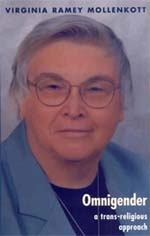 Finds Itself 'De-Queered' in New York No Distinct Gay Presence at America's Largest Book Show Previous Shows Played Host to 'Gay Alleys' & 'Gay Rows' |
|
By Perry Brass
Thankfully, the "Death of the Book" has just not happened. In fact, two thousand exhibitors displayed the argument that books - beautiful, popular, cheap, expensive, all types, all styles, all paper - are here to stay. If there was an electronic presence at the Javits Center, it was more from software producers trying to come up with the right software to deal with the book in all its forms, but not to replace paper books with electronic ones. The sellable forms of the book, or what you can do with a book once it leaves being only something on paper, that's another issue. I will go into that later. Second: Frodo, we done met the Future, and it is Lord of the Rings . The Lord and the Rings and all the money it's made were all over the place. Huge displays of Lord of the Rings, lines of people for Lord of the Rings, video monitors for Lord of the Rings video loops, lots and lots of Lord of the Rings. When a big movie (or a trio of them) comes out that leads directly to a literary product, bookstores go nuts. And, for your information, bookstores were back. They came back to BEA, after virtually boycotting it for a few years after the convention left the aegis of the American Bookseller's Association, an independent bookseller's trade group. BEA was known, until recently as the ABA convention. When it was bought by Reed Expositions, a huge, mega-show corporation that specializes in Los Vegas-type trade shows, bookstore personnel attendance plummeted. That's back now. Bookstore people from Topeka to Alaska, looking dazed, exhausted, and overstimulated, were there. This proves my theory that going to a bookstore and reading a book is like meatloaf-and-mashed potatoes. Pure comfort food for the soul. No matter what form bookstores take - small, huge, chain, with cafes, giftshops, leather fetish items, gay, erotic, black, Hispanic, etc. -people still want to leave their homes and go someplace where other people are browsing through books, just like they are. And finally, third: there was no distinct gay presence at BEA. Virtually, at all. Number three hurt me a lot. In the old days, like pre-yesterday, every year there was a real, physical gay presence at America's premiere book event. It was referred to as "Gay Alley" or "Gay Row" and it was a stretch of about ten booths anchored by several larger gay presses, like Naiad, Firebrand, Alyson, Spinster's Ink, or Damron with assistance from Bert Herrman's Alamo Square Distributors, the only exclusively glbt book distributorship in the country, and the Lambda Literary Foundation, which produces the Lambda Book Awards, or "Lammies," the country's national glbt book awards. Clustered around the larger presses (and larger here means they put out more than ten titles a year) groups of smaller "micro" presses like Circlet, which publishes kinky gay/bi fantasy-erotica; Greenery, an S & M press; Odd Girls, a nice lesbian press; and Belhue Press, which publishes Perry Brass, added to the mix. Usually, near by was an assortment of "adult" product lines, such as cards, calendars, novelties, lube, etc. which felt comfortable being in a gay environment within a very commercial convention setting that's basically K-Mart American. Naiad and Firebrand have both gone under. Alyson is owned by the Advocate and has become very corporatized. For a gay press, it wants big straight sales numbers. The only setting that seemed remotely "Gay" at BEA joined a stretch of the large Alyson Publications booth with the independent distributor Consortium, out of St. Paul, MN. Consortium has a fairly large gay list, but does not emphasize gay presses. Consortium will not look at micro-presses, which means that if you and your friends want to self-publish one or two tomes, don't knock on their door. This is very different from a few years ago when Consortium was in competition with L.P.C. InBook, once the largest distributor of independent press books in the U.S., which encouraged "one-shots" and micro-presses, if they felt sales from these books would be worth their while. It is a sign of our times that Consortium will not bother with these often very adventurous types of books and L.P.C. InBook, the latest incarnation of what was once Inland Book Company out of East Haven, Connecticut, has declared bankruptcy.
Now that the wild-and-crazy Mr. Wilk is into his second sticky bankruptcy, the queerish part of the book world is heading for more trouble--but, as I always say, you have to be nuts to stay in these woods anyway. The big question at BEA this year was, Would the ponytailed Mr. Wilk show up? As far as I know, he didn't. Alamo Square's sales also plummeted a few years ago, when the distractions of the Internet; Barnes and Noble playing dirty pool by building superstores next to urban glbt stores; and Amazon.com all hit at once. Facing bankruptcy, Bert Herrman sold Alamo Square to a small distributor in Marin County, CA. Alamo no longer has a presence at BEA; it is still functioning, but its sales are a fraction of what they were five years ago. For almost a decade, Alamo and the staff of Bookazine, a wholesaler out of New Jersey that is very gay friendly, held the gay presence at BEA together. We saw the fragility of that presence in the score or so of gay bookstores that went under circa 1998-99. The book world moves with lightening speed. Stores come, go, and, hopefully, in another form come back. Personnel changes quickly. So you try to grab on to any sense of permanence you can have in this environment. Some of our more self-satisfied readers and big bookstore chain people see no need to have a "Gay Alley" presence at all. For them it ghettoizes gay and lesbian books, now that many university presses and even some larger presses are routinely putting them out. They would ask, "Why cluster this presence now that it is commercially viable?" But even seasoned gay and lesbian bookstore people have a harder time finding titles that will appeal to their customers, since these titles will be scattered through lists that can have hundreds of books in them. And some people, no matter how "out" they are, still find it hard to walk up to, say, Random House, whose booth eats up almost an entire city block, with an army of salespeople in it, and say, "Uh, sir, do you have any gay titles for me?" There was also something warm and homey about Gay Row. You could meet dozens of people involved with the whole range of this kind of books--people from bookstores, overseas distributors, wholesalers, editors, promoters, gay journalists, media people--in short, the whole panoply of the gay book world in one place. In years past, I could speak, face-to-face, with a hundred people in two days, get their business cards, talk about coming books, and feel that I was in the center of a very exciting part of my profession. That is gone. What has replaced it is the glbt book as just another part of a quixotic business landscape with no visible community behind it. This is sad. I wish it were different. On the other hand, BEA showed me that having gay books--and openly displaying them--has become a point of pride for many publishers, even if their personnel is not at all openly gay. I saw this many, many times browsing through booths--having books with "blatantly" gay content is no longer the problem. The problem is finding the books. One of the most recent offshoots in this trend is the large number of books that deal positively with the glbt presence in a religious setting. I stopped by the booth of Pilgrim Press, a religious publisher whose catalogue claims this is "Where Spirituality and Real Life Meet." They are right, and it's about time. Pilgrim now has about a dozen glbt titles and is actively seeking more. They had just won a Lambda Book Award in the Transgender/Bisexual category for Omnigender, A Trans-religious Approach by Virginia Ramey Mollenkott. Pilgrim's anthology Queer Commentary and the Hebrew Bible, edited by Ken Stone was a Lammy finalist in the Spirituality category. The fact that these books are integrated with their other titles is heartening, although it would nice if they had a separate list of their other glbt books, so that they could be seen as a group by librarians, buyers, etc. Again, you have the problem: how do bookstore buyers, gay or not, find these books, scattered through two thousand exhibitors in 300,000 square feet of space? As to my other book story -- what happens to a book when it stops existing only on paper? -- that is the central issue in the book world now. Will we have to establish a visual literacy that will take the place of the verbal one we have? The book, as any literary agent will tell you, now goes from its paper form, to a CD-Rom, to an audio format, to a video--but with each step it loses that immediacy of print. It becomes instead of a published item, a "produced" item. This means that its very existence will depend upon thousands of production decisions instead of the book's original content. In Hollywood there is an old truism: bad books make great movies. But what happens to great books? Do they get lost in the production shuffle? Books are one of the cornerstones of American freedom, but it is easy to see this cornerstone destroyed in a cut-throat commercialism that is as lethal to a free culture as Nazi book burning. Books represent one human being's pivotal view of the world. It is a view that should not be obscured by a greed-bound board of directors, a million unseen stockholders, or an autocratic government that decides who should publish and who should not. There is something powerful and amazing in this fragile form of communication. When Abraham Lincoln said to Harriet Beecher Stowe, the author of Uncle Tom's Cabin, "So, you're the little lady who caused the great war," he knew what the power of this form was. That power becomes often too lost in a place as big as six football fields.  Perry Brass's newest novel is WARLOCK, A Novel of Possession,
that does deal with the interesting intersection of business and evil.
His "domestic partnership" is not underwritten by any of the Fortune 500.
He can be reached through his website www.perrybrass.com. For more information
on WARLOCK, go to http://www.amazon.com/exec/obidos/ ASIN/1892149036/107-8161877-7587701
Telephone: 1 (800) 365-2401.
Perry Brass's newest novel is WARLOCK, A Novel of Possession,
that does deal with the interesting intersection of business and evil.
His "domestic partnership" is not underwritten by any of the Fortune 500.
He can be reached through his website www.perrybrass.com. For more information
on WARLOCK, go to http://www.amazon.com/exec/obidos/ ASIN/1892149036/107-8161877-7587701
Telephone: 1 (800) 365-2401.
|



